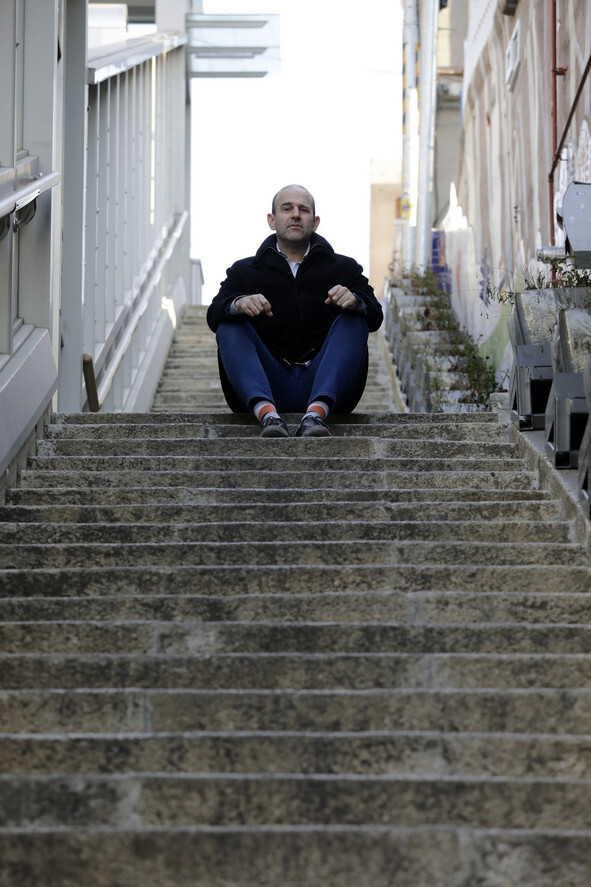hankyoreh
Links to other country sites 다른 나라 사이트 링크
Gay visiting professor at SNU denied “family housing”

“They are the premier elite university in South Korea, with aspirations to becoming a ‘global university.’ I can’t understand why they are going against the times like this.”
Todd A. Henry, 49, an associate professor of history at the University of California, San Diego who a year as a visiting professor at the Seoul National University (SNU) Kyujanggak Institute for Korean Studies, could not suppress his frustration. Before the start of classes in the first semester of 2019, he requested lodging in the family wing of BK International House, a dormitory for foreign professors and researchers. Henry, who is gay, wanted to live there with his partner of two years and six months; school authorities rejected his application, citing administrative rules stating that “only married persons may reside in the family wing.” When Henry asked whether he could apply for the dormitory if the two married in their home country, the dormitory said it would “need to have further discussions in the case of a same-sex marriage,” but offered no further reply.
Henry ended up finding separate accommodations, where he stayed with his partner before returning to the US on Jan. 1 of this year. A ban on same-sex marriage in Henry’s home state of California was abolished in 2013, and same-sex marriage was legalized through the US with a 2015 Supreme Court decision finding prohibitions to be unconstitutional.
Deciding that the SNU dormitory policy constituted discrimination against LGBTQ persons, Henry raised the issue in March 2019 with the SNU diversity committee and human rights center, but to no avail. In May, he raised the issue again in a contribution to the SNU student press “The University Newspaper” titled “The ‘family wing’ should reconsider ‘family.’”
In it, he argued that LGBTQ couples should also be guaranteed the right to receive SNU benefits such as housing; again, he drew no response.
“I discussed the matter with the SNU human rights center, and then they didn’t show any interest, saying that they ‘mainly deal with sexual violence,’” he recalled. “I sent an email to the SNU diversity committee, and they told me to contact the human rights center, telling me that their ‘chief functions are research and studies.’”
“I was disappointed to see that institutions established to ensure the security of minorities were ignoring such an important issue,” he said.
Henry previously studied in SNU’s Korean history graduate program in 2003 as a research student and was active at the time in a campus LGBTQ group. In the US, he recently punished “Queer Korea,” which examined issues of LGBTQ history, culture, and human rights in Korea.
SNU has yet to state any position on the issue. In a Jan. 28 telephone interview with the Hankyoreh, Lee Sang-won, a law professor who serves as director of the SNU human rights center, said that the “contents and outcome of counseling cannot be shared with the outside.” In another telephone interview the same day, a representative of BK International House said, “We are aware of the issues raised by Professor Henry, but because same-sex marriage has not been legalized in South Korea at present, the issue of housing for same-sex families will require further discussion.”
Currently, the SNU student council-affiliated student and minority human rights committee is taking an interest in the issue, with plans to propose a roundtable discussion with the school dormitory in the near future.
“There is a global trend, as we’ve seen with Korean Air’s recent decision to apply its ‘family mileage’ system to same-sex couples recognized as married in their country, and SNU needs to adopt a responsible stance in line with this,” said Ryu Min-hee, an attorney with the group Korean Lawyers for Public Interest and Human Rights.
By Lee Ju-hyeon, staff reporter
Please direct comments or questions to [english@hani.co.kr]

Editorial・opinion
![[Column] How tragedy pervades weak links in Korean labor [Column] How tragedy pervades weak links in Korean labor](https://flexible.img.hani.co.kr/flexible/normal/500/300/imgdb/original/2024/0703/8717199957128458.jpg) [Column] How tragedy pervades weak links in Korean labor
[Column] How tragedy pervades weak links in Korean labor![[Column] How opposing war became a far-right policy [Column] How opposing war became a far-right policy](https://flexible.img.hani.co.kr/flexible/normal/500/300/imgdb/original/2024/0702/5017199091002075.jpg) [Column] How opposing war became a far-right policy
[Column] How opposing war became a far-right policy- [Editorial] Korea needs to adjust diplomatic course in preparation for a Trump comeback
- [Editorial] Silence won’t save Yoon
- [Column] The miscalculations that started the Korean War mustn’t be repeated
- [Correspondent’s column] China-Europe relations tested once more by EV war
- [Correspondent’s column] Who really created the new ‘axis of evil’?
- [Editorial] Exploiting foreign domestic workers won’t solve Korea’s birth rate problem
- [Column] Kim and Putin’s new world order
- [Editorial] Workplace hazards can be prevented — why weren’t they this time?
Most viewed articles
- 1Car behind deadly crash began rapid acceleration after exiting underground garage
- 2South Koreans living near border with North unnerved by return of artillery thunder
- 3Democrats ride wave of 1M signature petition for Yoon to be impeached
- 4[Column] How tragedy pervades weak links in Korean labor
- 5Hyundai Motor sets up one-stop shop for EV production in Indonesia
- 6In the blink of an eye, an unthinkable crash turned a night out into a nightmare
- 7S. Korea “monitoring developments” after report of secret Chinese police station in Seoul
- 810 days of torture: Korean mental patient’s restraints only removed after death
- 9Families, friends mourn loved ones cut down in prime in deadly car crash
- 10[Column] How opposing war became a far-right policy